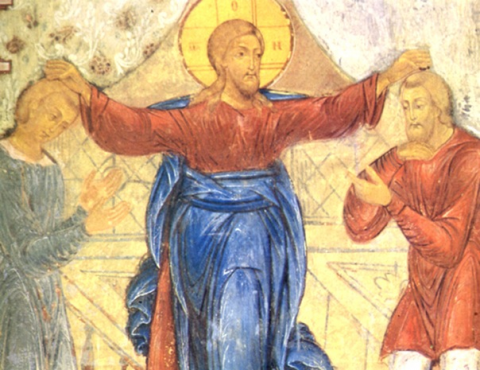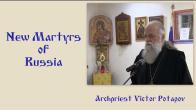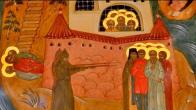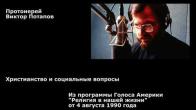You are here
7th Sunday after Pentecost

The Tongue: Asset or Curse?
“But the Pharisees kept on saying, ‘It is by the help of the prince of the demons that He drives them out’” (Matthew 9:27-35).
St. Chrysostom says that nothing is worse than ingratitude. And indeed, dear brethren, nothing annoys man so much as the behavior of an ungrateful person. When someone gives you even so small a thing as a glass of water when you are thirsty, the rules of etiquette prescribe that you thank him. Even a simple person, who knows nothing of etiquette, says thank you out of common courtesy. I shall never forget when I was a student in Constantinople and wished, after a day of shopping in the city, to get a ride back to my lodging on a bus. Much to my embarrassment, I found that I had not one cent left in my pocket with which to pay the driver. Just as he was about to slam the door in my face, a stranger, a Turk, paid my fare for me. I shall never forget the favor of this modern-day "good Samaritan."
Today's Gospel Lesson, however, does not deal with material goods which, regardless of their value, remain lifeless matter; rather, the Gospel Lesson relates the healing by Jesus of three grievously afflicted people — two blind men, and one deaf and dumb. Both miracles are noteworthy, else Matthew would not have recorded them for us. St. John writes, "There are many other things that Jesus did, which, if they were all written down in detail, I do not suppose that the world itself could hold the books that would have to be written" (John 21:25). But what about those things Jesus said and did that were not recorded for us? These became Tradition, passed on orally from one generation of Christians to another. The Church has been and remains the guardian, the judge, and the touchstone upon which was decided the integrity and genuineness of that which has become known as Tradition.
Matthew does not describe for us the attitude, the behavior of the blind, deaf, and dumb after their healing. We presume that they were grateful to the Master, unlike the nine lepers of Luke 17. Matthew does describe for us, however, the attitude and behavior of the Pharisees. These leaders of the Jewish people, because they could neither deny nor doubt the reality of these miracles, instead launched a vicious accusation, not only against Christ, but against the Holy Spirit as well: "He casts out the demons by the ruler of the demons." Previously they had accused Him of violating the sacred character of the Sabbath. Once before they had accused Him of permitting His disciples to eat without washing their hands. Another time they accused Him of eating with tax-collectors and sinners. This accusation, however, was the worst of all. Why? Because there have always been (and still are) simple people who are all too ready to believe vicious slander about a person. In America the thing to do is accuse the person you don't like of being a homosexual. In Greece you call him a communist. In first-century Palestine you accused him of dealing with evil spirits — a sure way to get rid of your enemies.
The ancient philosopher and moralist Theocritos was once asked which of the wild beasts he considered to be the worst. He wisely replied that, while in the hills there are lions and bears, yet in the cities there are the tax-collectors and sycophants — the latter much more dangerous than the former. It was for this reason that King David used to pray, "The proud have forged a lie against me: but I will keep thy precepts with my whole heart" (Psalm 119:69).
Because the people considered the Pharisees to be great and distinguished men, and because the Pharisees were incapable of duplicating the miracles of Jesus (and who among mortal men could?), they had to accuse Him, and their accusation was horrible: "The ruler of the devils helps Him drive out the devils." St. Chrysostom points out that, not only was the accusation brought about by envy, it was utterly foolish; for, the father of the Church continues, the healing ministry of Christ was not limited to casting out demons: "And He cleansed lepers, raised the dead, calmed the stormy seas, forgave sin, proclaimed the Kingdom of heaven, and much more." Dearly beloved, very often the false accusers, drunk with the zeal of their envy, know not where to start nor where to stop. They have but to open their mouths, and out flow slander and calumny without logic and without limit. The evil becomes multiplied when the slander turns into an organized "smear campaign," as we see in today's Gospel Lesson, where all the Pharisees take their lying stand opposed to the Son of God.
An old legend relates that an Egyptian king once sent a dead animal to be used in sacrifice to the philosopher Pittokos, in order that the latter might determine which part of the dead animal was the most valuable, and which part the least value. The philosopher cut out the animal's tongue and returned it to the king with a short note: "This is both the most valuable and the most worthless part of the animal." Naturally, the philosopher was speaking metaphorically of the human tongue. St. James writes, "The tongue … is a little organ but can boast of great achievements … The tongue is a fire, and takes its place among the parts of our bodies as a world of evil; it soils the whole body and sets on fire the circle of man's nature, and itself is set on fire by hell... It is an evil incapable of being quieted, full of deadly poison. With it we bless the Lord and Father, and with it we curse men who are made in God's likeness. Out of the same mouth flow blessing and cursing" (James 3:5-10).
God gave us our tongues to use for good, not for false accusations. Out of the whole creation, man is the only creature that can slander, calumniate and lie. "Thou shall not bear false witness against thy neighbor" (Exodus 20:16). Let's remember that we do not possess a monopoly on virtues; our neighbors have some, too. And let us remember these awesome words of our Lord: "I say unto you, that every idle word that men shall speak, they shall give account thereof in the day of judgment. For by thy words thou shall be justified, and by thy words thou shall be condemned" (Matthew 12:36-37).
Address of our Cathedral
Subscribe to our mailing list
While all the materials on this site are copyrighted, you may use them freely as long as you treat them
with respect and provide attribution on the Russian Orthodox Cathedral of St.John the Baptist of Washington DC.









